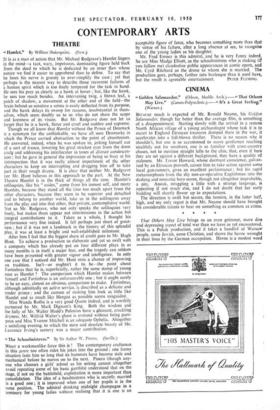CONTEMPORARY ARTS
THEATRE
dc Hamlet." By William Shakespeare. (New.) IT is as a man of action that Mr. Michael Redgrave's Hamlet lingers in the mind—a taut, wary, impetuous, dominating figure held back from the deed to which he is dedicated by an inner flaw whose nature we find it easier to apprehend than to define. To say that he loses his nerve is grossly to over-simplify the case ; yet that i perhaps is the nearest way to describe those recurrent failures of a human spirit which is too finely tempered for the task in hand. He sees his prey as clearly as a hawk at hover ; but, like the hawk, he sees too much besides. An intervening twig, a blown leaf, a patch of shadow, a movement at the other end of the field—the brain behind so sensitive a retina is easily deflected from its purpose, and the hawk delays its swoop for reasons, insubstantial in them- selves, which seem doubly so to us who do not share the scope and keenness of its vision. But Mr. Redgrave does not let- us forget that he is a hawk, fierce and cruel and sudden and supreme.
Though we all know that Hamlet without the Prince of Denmark is a synonym for the unthinkable, we have all seen Denmarks in which the Prince carried abstraction to the point of absenteeism. He answered, indeed, when he was spoken to, jerking himself out of a sort of trance, lowering his great stricken eyes from the dress circle and addressing his interlocutor in tones of distrait condescen- sion ; but he gave in general the impression of being so busy at his introspection that it was really almost impertinent of the other characters to keep on interrupting and dragging him off to take part in their rough drama. It is clear that neither Mr. Redgrave nor Mr. Hunt believes in this approach to the part. At the New Theatre Hamlet is in the thick of things all the time. Hamlet's soliloquies, like his " asides," come from his inmost self, and many Hamlets, because they stand all the time too much apart from the other characters, because they seem to be superior and detached and to belong to another world, take us in the soliloquies away from the play and into that other, that private, contemplative world. Not so Mr. Redgrave, who not only speaks the soliloquies very finely, but makes them appear not intermissions in the action but integral contributions to it. Taken as a whole, I thought his performance very fine indeed. It fell perhaps just short of great- ness ; but if it was not a landmark in the history of this splendid play, it was at least a bright and well-established milestone.
After him I feel that the biggest share of credit goes to Mr. Hugh Hunt. To achieve a production so elaborate and yet so swift with a company which has already put on four different plays in as many months is in itself a major feat, and the tragedy can seldom have been presented with greater vigour and intelligence. In only one case that I noticed did Mr. Hunt miss a chance of improving on tradition. Isn't—or oughtn't it to. be—the point about Fortinbras that he is, superficially, rather the same stamp of young man as Hamlet ? The comparison which Hamlet makes between himself and Fortinbras is an unfavourable one ; but it ought surely to be an easy, almost an obvious, comparison to make. Fortinbras, although admittedly on active service, is described as a delicate and tender prince ; and the custom of making him look as little like Hamlet and as much like Hengist as possible seems misguided. Miss Wanda Rotha is a very good Queen indeed, and is worthily partnered by Mr. Mark Dignam's King. Both the wisdom and the folly of Mr. Walter Hudd's Polonius have a pleasant, crackling dryness, Mr. Wilfrid Walter's ghost is orotund without being pom- pous and Miss Yvonne Mitchell is an adequate Ophelia. Altogether a satisfying evening, to which the stern and desolate beauty of Mr. Laurence Irving's scenery was a major contribution.


































 Previous page
Previous page